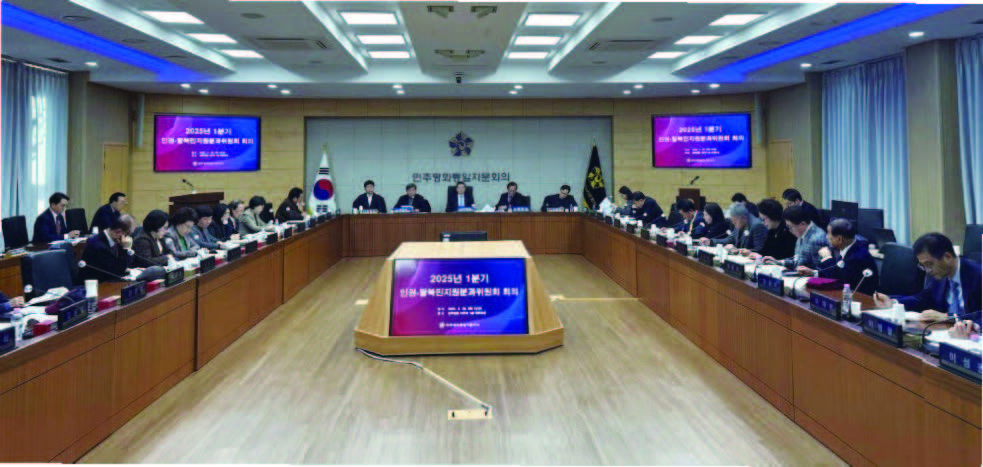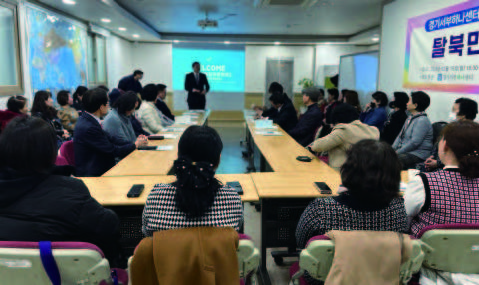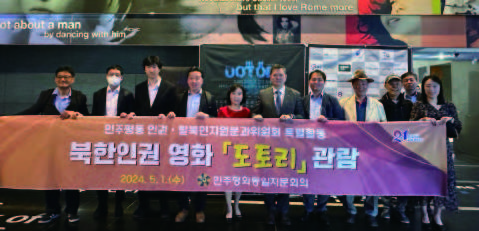[Domestic] Human Rights and North Korean Defectors Support Standing Committee, a Field-oriented Standing Committee to Improve Human Rights in North Korea and Support Defectors' Resettlement," "Practical Policy Proposals and Activities for Customized Support for Defectors' Life Cycle
- Consultation & Advice Division
- 05-15-2025 ~ 05-15-2025
Human Rights and North Korean Defectors Support Standing Committee, a Field-oriented Standing Committee to Improve Human Rights in North Korea and Support Defectors' Resettlement," "Practical Policy Proposals and Activities for Customized Support for Defectors' Life Cycle
The Human Rights and North Korean Defectors Support Standing Committee (Chairperson Lee Jung-hoon, Secretary Kim Dong-soo) is a standing committee newly established in the 21st-term PUAC. It aims to make practical contributions to the urgent tasks of improving human rights in North Korea and supporting the resettlement of North Korean defectors. The 55 standing committee members include experts on North Korean human rights and North Korean refugees, and activists from various regions. The Committee holds statutory meetings to improve North Korean human rights and make policy proposals. It also held six special activities to reflect the voices of the field into policy.
Written by Kwon Hye-jin (Chief Auditor, Korea Institute for National Unification, member of the PUAC Central Committee).
Photo by Human Rights and North Korean Defectors Support Standing Committee

The first quarter 2025 meeting of the Human Rights and North Korean Defectors Support Standing Committee was held in the conference room on the 1st floor of the Secretariat
The Human Rights and North Korean Defectors Support Standing Committee, which was newly established in the 21st-term PUAC, is engaged in various activities, including domestic and international cooperation to improve human rights in North Korea, cooperation and humanitarian assistance to improve the quality of life of North Koreans, restoration of family communities through reunions of separated families and repatriation of POWs, kidnapped people and detainees, support for vulnerable groups such as women, children, and people with disabilities, and support for stable resettlement of North Korean defectors.
The Committee has been paying attention to important issues that need to be addressed by the South Korean government, such as human rights protection and resettlement of North Korean defectors, human rights issues of North Korean citizens, and repatriation of abductees. In particular, the Committee has attended international conferences and visited major sites such as Hanawon, Hana Center, group homes, and human rights museums, making efforts to deliver policy improvement directions to the South Korean government and the international community based on the voices of the field.
A Practical Committee where Experts and North Korean Refugees Work Together
The Committee is notable for its members who combine expertise and field experience. Lee Jung-hoon, who served as South Korea's first ambassador for human rights, is currently the chairman of the Future Unification Planning Committee and is considered a leading expert on human rights in North Korea. Secretary Kim Dong-soo, a former North Korean diplomat, is a human rights activist who has won numerous domestic and international awards for his work to improve human rights in North Korea.
Particularly noteworthy is the participation of seven Central Committee members who are North Korean defectors, including Kang Chol-hwan, Head of the North Korea Strategy Center; Kim Gum-ok, President of the Kim Gum-ok Culinary Institute; Kim Ji-un, Vice President of the Well Saem Hospital of Korean Medicine; Park Ji-na, President of the Chin Oriental Clinic; and Lee Yong-chol, CEO of LTK. Active in various walks of life such as healthcare, education, economy, and social welfare, they play a role in reflecting the real voices of North Koreans in policy.
In addition to these members, the committee members have a wealth of experience in various fields such as law, healthcare, welfare, religion, and business. They are making various efforts to improve human rights in North Korea and find effective policy directions for the successful resettlement of North Korean defectors.
Major Activities and Achievements in Support of North Korean Human Rights and North Korean Defectors
In 2023 and 2024, the 21st-term Human Rights and North Korean Defectors Support Standing Committee conducted six special activities to help the issues of North Korean human rights and the resettlement of North Korean defectors take root in South Korea.
In September 2023, on the occasion of the “20th North Korea Freedom Week," the Committee held a meeting to encourage North Korean human rights activists in South Korea and abroad. It was attended by Chairperson Lee Jung-hoon, committee member Kang Chol-hwan, and Susan Solti, head of the North Korea Freedom Coalition. They discussed cooperation among North Korean human rights NGOs. In October, 20 Central Committee members visited Hanawon (Anseong) to observe the education process of North Korean defectors and gather opinions on their successful resettlement.
In November, The Committee co-hosted the 'Symposium on Ensuring North Koreans Digital Freedom’ at the Westin Chosun Hotel in Seoul. The symposium addressed issues of human rights and digital freedom in North Korea. Chairperson Lee Jung-hoon made the opening remarks, followed by a keynote speech by former COI Chair Michael Kirby. Former U.S. Department of State Ambassador for North Korean Human Rights Robert King and former UN Special Rapporteur on North Korea Marzuki Darusman attended the symposium, which explored the practical role of human rights and digital freedom in North Korea. Activities continued in 2024. In February, the Committee visited the NKDB North Korean Human Rights Museum and the Western Gyeonggi Hana Center to discuss policy roles for the inclusion of North Korean defectors and to hear about their difficulties. In May, the Committee attended the premiere of the North Korean human rights film "Acorn" at the Daehan Theater. Committee members listened to the impressions of the film's producer, Kim Dong-soo, and the lead actors, and discussed ways to raise awareness of North Korean human rights using cultural content.
In November, the Committee visited North Korean defectors support facilities in Daejeon Metropolitan City and Geumsan County, Chungnam Province, where members discussed cooperation with officials involved in the North Korean refugee resettlement program. The Committee also visited Seodae Mountain Memorial Park, a memorial dedicated to North Korean defectors, and discussed its future operations. It also donated money to the East-West -South-North Shared Living Home, a welfare facility for children of North Korean refugees. In 2025, the Human Rights and North Korean Defectors Support Committee will continue its efforts to improve human rights in North Korea and support the successful resettlement of North Korean refugees through various field activities. Through these activities, the Committee will gain a deeper understanding of the various problems faced by North Korean defectors in each region and come up with policy alternatives.

In April 2024, the Committee visited the Western Gyeonggi Hana Center to hear about the problems of North Korean defectors in the area.

In May 2024, the Committee attended the premiere of the North Korean human rights film "Acorn" at the Daehan Theater to hear from Kim Dong-soo, the film's executive producer, and the lead actors about the production.
-
How satisfied are you with the information you have reviewed?







